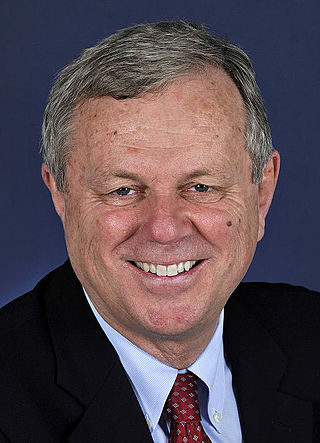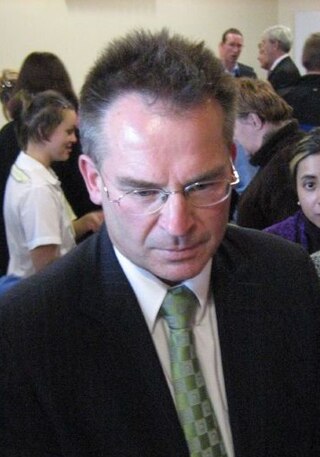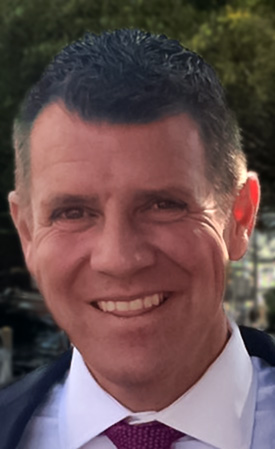
The Country Liberal Party of the Northern Territory (CLP), commonly known as the Country Liberals, is a centre-right political party in Australia's Northern Territory. In local politics, it operates in a two-party system with the Australian Labor Party (ALP). It also contests federal elections as an affiliate of the Liberal Party of Australia and National Party of Australia, the two partners in the federal coalition.
The premiers and chief ministers of the Australian states and territories are the heads of the executive governments in the six states and two self-governing territories of Australia. They perform the same function at the state and territory level as the Prime Minister of Australia performs at the national level. The King of Australia and the state governors are the formal repositories of executive power; however, in practice they act only on the advice of state premiers and ministers except in extreme circumstances, such as a constitutional crisis.

Norfolk Island elects on territorial level a legislature. The Norfolk Island Legislative Assembly has 9 members, elected for a three-year term. The last assembly was the 14th, elected on 13 March 2013. On 17 June 2015, the Australian government abolished the assembly, ending self-government on the island. Norfolk Island Regional Council, a local government body with significantly-restricted powers, was established in July 2016 to perform local-level governance on the island.

The state election for the 51st Parliament of South Australia was held in the Australian state of South Australia on 18 March 2006 to elect all members of the South Australian House of Assembly and 11 members of the South Australian Legislative Council. The election was conducted by the independent State Electoral Office.

The 2007 New South Wales state election was held on Saturday, 24 March 2007. The entire Legislative Assembly and half of the Legislative Council was up for election. The Labor Party led by Morris Iemma won a fourth four-year term against the Liberal-National coalition led by Peter Debnam.

State elections were held in South Australia on 11 October 1997. All 47 seats in the South Australian House of Assembly were up for election. The incumbent Liberal Party of Australia led by Premier of South Australia John Olsen defeated the Australian Labor Party led by Leader of the Opposition Mike Rann, forming a minority government with the SA Nationals and independent MPs.

The Norfolk Island Legislative Assembly was the prime legislative body of Norfolk Island from 1979 to 2015. Formed after the Norfolk Island Act 1979 was passed in the Australian Parliament, its first members were elected on 10 August 1979. The last assembly was the 14th, elected on 13 March 2013. On 17 June 2015, the Australian Government abolished the assembly, ending self-government on the island. Norfolk Island Regional Council, a local government body instituted under New South Wales law and with significantly-restricted powers, was established in July 2016 to perform local-level governance on the island.

Elections to the Australian Capital Territory Legislative Assembly were held on Saturday, 20 October 2001. The incumbent Liberal Party, led by Gary Humphries, was challenged by the Labor Party, led by Jon Stanhope. Candidates were elected to fill three multi-member electorates using a single transferable vote method, known as the Hare-Clark system. The result was another hung parliament. However Labor, with the largest representation in the 17-member unicameral Assembly, formed Government with the support of the ACT Greens and Democrats. Stanhope was elected Chief Minister at the first sitting of the fifth Assembly on 12 November 2001. The election was conducted by the ACT Electoral Commission and was the first time in Australia's history that an electronic voting and counting system was used for some, but not all, polling places.

Elections to the Australian Capital Territory Legislative Assembly were held on Saturday, 16 October 2004. The incumbent Labor Party, led by Jon Stanhope, was challenged by the Liberal Party, led by Brendan Smyth. Candidates were elected to fill three multi-member electorates using a single transferable vote method, known as the Hare-Clark system. The result was a clear majority of nine seats in the 17-member unicameral Assembly for Labor. It marked the first and so far only time in the history of ACT self-government that one party was able to win a majority in its own right. Stanhope was elected Chief Minister at the first sitting of the sixth Assembly on 4 November 2004. The election was conducted by the ACT Electoral Commission and was the second time in Australia's history that an electronic voting and counting system was used for some, but not all, polling places, expanding on the initial trial of the system at the 2001 ACT election.

Elections to the Australian Capital Territory Legislative Assembly were held on Saturday, 18 October 2008. The incumbent Labor Party, led by Jon Stanhope, was challenged by the Liberal Party, led by Zed Seselja. Candidates were elected to fill three multi-member electorates using a single transferable vote method, known as the Hare-Clark system. The result was another hung parliament with Labor winning seven seats, the Liberals six seats and the Greens finishing with four seats, giving the Greens the balance of power in the 17-member unicameral Assembly. On 31 October 2008, after almost two weeks of deliberations, the Greens chose to support a Labor minority government. Consequently, Labor was re-elected to a third consecutive term of government in the ACT. Stanhope was elected Chief Minister at the first sitting of the seventh Assembly on 5 November 2008. The election was conducted by the ACT Electoral Commission.

The 2010 South Australian state election elected members to the 52nd Parliament of South Australia on 20 March 2010. All seats in the House of Assembly or lower house, whose current members were elected at the 2006 election, and half the seats in the Legislative Council or upper house, last filled at the 2002 election, became vacant.

The 2015 New South Wales state election was held on Saturday 28 March 2015. Members were elected to all 93 seats in the Legislative Assembly using optional preferential voting. Members were also elected to 21 of the 42 seats in the Legislative Council using optional preferential proportional representation voting. The election was conducted by the New South Wales Electoral Commission.

The 2018 South Australian state election to elect members to the 54th Parliament of South Australia was held on 17 March 2018. All 47 seats in the House of Assembly or lower house, whose members were elected at the 2014 election, and 11 of 22 seats in the Legislative Council or upper house, last filled at the 2010 election, were contested. The record-16-year-incumbent Australian Labor Party (SA) government led by Premier Jay Weatherill was seeking a fifth four-year term, but was defeated by the opposition Liberal Party of Australia (SA), led by Opposition Leader Steven Marshall. Nick Xenophon's new SA Best party unsuccessfully sought to obtain the balance of power.

The 2018 Victorian state election was held on Saturday, 24 November 2018 to elect the 59th Parliament of Victoria. All 88 seats in the Legislative Assembly and all 40 seats in the Legislative Council were up for election. The first-term incumbent Labor government, led by Premier Daniel Andrews, won a second four-year term, defeating the Liberal/National Coalition opposition, led by Opposition Leader Matthew Guy in a landslide victory. Minor party the Greens led by Samantha Ratnam also contested the election.
The ACT Labor Party, officially known as the Australian Labor Party (Australian Capital Territory Branch) and commonly referred to simply as ACT Labor, is the ACT branch of the Australian Labor Party (ALP). The branch is the current ruling party in the Capital Territory and is led by Andrew Barr, who has concurrently served as chief minister of the Australian Capital Territory since 2014. It is one of two major parties in the unicameral Australian Capital Territory Legislative Assembly, and is currently in a coalition with the ACT Greens.

The 2021 Western Australian state election was held on Saturday, March 13, to elect members to the Parliament of Western Australia, where all 59 seats in the Legislative Assembly and all 36 seats in the Legislative Council were up for election.

The 2022 South Australian state election was held on 19 March 2022 to elect members to the 55th Parliament of South Australia. All 47 seats in the House of Assembly, and half the seats in the Legislative Council were up for re-election.

The 2013 Norfolk Island legislative election was held on 13 March 2013 to elect the 14th Norfolk Island Legislative Assembly, the prime legislative body of Norfolk Island.

The 2007 Norfolk Island legislative election was held on 21 March 2007 to elect the 12th Norfolk Island Legislative Assembly, the prime legislative body of Norfolk Island.

The Norfolk Island Labor Party, also known simply as Norfolk Labor, was the Norfolk Island branch of the Australian Labor Party. It operated as a sub-branch of the ACT Labor Party.














